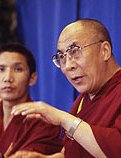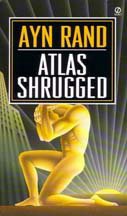
The Dalai Lama is speaking at Stanford University here in the San Francisco Bay Area today and, sadly, I can't go since (1) I have to work and (2) I found out too late to get a seat. However, it seems the event will be available as an audio download at Stanford university's site (
here).
The Dalai Lama has been promoting communication between Buddhism and neurobiology for some time now. There have been some interesting brain scans and studies regarding meditation and its effects. The Dalai Lama regards this as an indication that Buddhism and science may both be helped by these sorts of interactions.
I have read some of his notions on this, and the Dalai Lama seems very respecting of the proper boundaries of science and religion. At the same time, there is no doubt that studying the brain scans of meditators can't hurt the neurosciences and may help shed some light on brain plasticity (the ability of the brain to reform its architecture). In addition, in the spirit of Einstein's ideal religion of the future, religion that is open to the wonders science reveals, and willing to integrate with those discoveries, can be a positive in my view. It seems that most neuroscientists have enjoyed the cooperation and have had no problem with it.
Strangely, some protesters were present at the Stanford event. I wondered what this might be about, as I had generally thought the Dalai Lama had a favorable reputation around these parts. Looking into it, I found that the protest was instigated by some neurobiologists.
I thought that seemed rather odd to be so opposed to someone even speaking in an open speaking event which was specifically billed as a means of increasing interaction between the public and neuroscience.
In their letter of protest, Yi Rao (a neuroscientist from the Northwestern University of Chicago) claimed to "fully support" promotion of interaction between the public and neuroscientists. The "public" should mean people from all walks of life, even (and perhaps especially) religious figures. But Apparently, Yi Rao's idea of "interaction" is the public sitting quietly while the neuroscientists tell them what's what.
He went on to criticize recent findings on brain activity in meditators to be untested and the research limited. This is probably true, but if this is the case, then most scientists would see that as the very reason why more data needs to be collected and more discussions on the topic explored. Instead, this scientist seemed strangely out of step with the normal reaction of most other scientists.
The letter also pointed out that the basis of the Dalai Lama's position was reincarnation, which is opposed to neuroscience (Dalai Lamas are believed by Tibetan Buddhists to be a reincarnation of the previous Dalai Lama). While science itself cannot rule out the supernatural, it certainly doesn't support it or assume it exists. So, there is some truth to this point. However, the Dalai Lama's subject matter in this event is not on reincarnation or anything else of a supernatural nature, but simply on meditation and its effects as can be measured by brain scans, and the possible fruits of cooperation between Buddhist meditators and neuroscientists. To exclude a person from the conversation simply because of their religious position and background is madness, and certainly out of step with most scientists. It would be like excluding a Christian pastor or priest that was an educated astronomer from lecturing on astronomy simply because his religious position was based on belief in a deity in human form.
In science (and logic in general) there is an admonition against taking arguments on authority. The inverse of this principle would also be true, which is that we don't outright reject what a person is saying because of who they are either. Each claim should be evaluated on its own merits with the evidence, and this goes for neuroscientists and religious figures alike.
If this were a scientific journal, then certainly any claims outside of rigid science should be excluded simply on the basis of category. But in a conference specifically designed to involve the public (and public figures) all voices should be heard. If there is genuinely something amiss in the Dalai Lama's claims then a true scientist will seek to counter them with superior argument and evidence - not censor them because of the person's position or faith.
Robert Desimone (Director of the McGovern Institute for Brain Research at the Massachusetts), agrees with this line of study on meditation and brain activity, but warns that scientific bodies should "distance" themselves from particular religious beliefs. I certainly agree with this, but this wise notion shouldn't be thought of as requiring that any and all things someone might have to say should be banned, simply because of their religious status.
Thankfully, Yi Rao and others who signed this letter seem to be in the minority and, as I suspected, out of step. Studying a variety of brain behaviors (including mediation) seems a perfectly legitimate scientific endeavor, and having religious people enthusiastically cooperative in these efforts is a bonus. But it's as if they were responding to some sort of pseudo science which had been shown to be bogus or was based on bad science.
Something didn't seem right about this so I did some more digging and, sure enough, both Yi Rao and the protest's organizer, neuroscientist Jianguo Gu (university of Florida) just so happen to be from China!
For those that don't know, the Dalai Lama and China have been at odds for a long time now because of a dispute over the sovereignty of Tibet. The Dalai Lama, who would have been Tibet's religious and cultural leader, fled when the Chinese government asserted its control over the region and has been traveling the world, writing books, and nurturing interfaith dialogue while hoping to also get the word out about Tibet's plight. China, needless to say, doesn't like this.
China has been nice enough to invite the Dalai Lama to return many times. But, given that the Chinese government took the Panchen Lama (2nd to the Dalai Lama) into "protective custody" ten years ago and has not been seen since, I can't say I blame the Dalai Lama from declining the invitation.
So, we're left wondering about this Yi Rao, Jianguo Gu, and a few others. Some online have been saying they are paid agents of the Chinese communist government, but far be it from me to claim to know such things. Perhaps they are just sadly warped by China's propaganda. Either way, although the Department of Homeland Security shouldn't bother itself with defending Dalai Lamas against lecture protests, these sorts of activities might be a secondary sign that looking into these folks backgrounds could be a good idea.
References:
San Francisco Independent Media Center:
http://sf.indymedia.org/news/2005/08/1718198.php
Berkeley information:
http://mcb.berkeley.edu/courses/mcb163/sfn.html
Original Nature article (should readers wish to subscribe to this fine magazine):
http://www.nature.com/news/2005/050725/full/436452b.html
Stanford event webcast:
http://dalailama.stanford.edu/video/
About the Dalai Lama:
http://en.wikipedia.org/wiki/Dalai_Lama
About the Dalai Lamas thoughts on science & neurobiology:
http://www.mindandlife.org/hhdl.science_section.html



